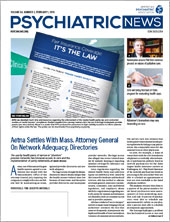Linguistics and psychology intersect in the field of semantics. Derived from the Greek word sēmantikós, which means “significant,” the study of semantics is concerned with the relationship between words and meaning. The words we use to describe ourselves and others are consequential, and the way we choose to communicate them can significantly impact how we think and feel. Many psychiatrists’ first lesson in professional semantics concerns how we refer to patients, but there is a variety of other important ways we use language in clinical, administrative, and policy settings. This column will examine several of the ways language and word choice shape perceptions about our work.
Mental health advocates have endeavored for decades to get physicians and policymakers to call people with schizophrenia just that, rather than “schizophrenics.” The difference, although superficially subtle, is profound. A person with schizophrenia is first a person, and as a person deserves to be treated with the same respect and dignity as any other person. Calling someone “a schizophrenic” reduces that person’s identity to the diagnosis and has a dehumanizing effect.
Another semantic distinction comes from the psychoanalytic literature. As early as Freud, parents or other important figures in the life of the infant and child were referred to as “objects,” eventually leading to Object Relations Theory. There is some utility in conceptualizing the child’s projections and experiences using this less personal vocabulary, to signify that it is the internalized representation of the parent, not the actual parent, that is the subject of interest. As valid as this justification may be, thinking about the parent as an “object” or “part object” reduces the humanity of the parent and semantically suggests a psychological experience of relative alienation for the developing child. This tension between psychoanalytic nomenclature and the mundane meaning of the word “object” primarily exists for readers of psychoanalytic theory and probably has little impact on patients or the public, except when they’re also reading this literature.
A more prominent semantic tension is found in the different ways mental health professionals refer to the people they treat. Psychiatrists, by virtue of our training and identity as physicians, think of the people we serve as patients. Mental health professionals who are not medical doctors tend to use the word “client” instead of “patient.” In some clinical settings, especially mental health centers and other multidisciplinary treatment environments, calling patients “clients” is part of the institutional culture. Furthermore, in some contexts, the word “consumer” is preferred, especially in environments like mental health clubhouses or large health care systems. Those of us who think of our patients as patients may bristle at these other terms as they imply a different kind of relationship than the one for which we were trained.
Similarly, health care administrators and economists may lump all clinicians together as “providers.” This may be an efficient linguistic trick to avoid listing all the disciplines in a particular institution or field, and it validates that other mental health disciplines contribute significantly to patient care, but it also subtly diminishes the identity of the health care worker. To refer to a psychiatrist as a mental health provider may suggest that our particular skills and training are not especially different or consequential compared with other mental health professionals. A person who is proud of his or her professional discipline as a nurse or psychologist or social worker may have a parallel aversion to being lumped together with generic providers.
An implication of the patient/client/consumer and psychiatrist/provider dichotomies is that we may think of our work in a very different way than do administrators, insurers, and policymakers. Our vocabulary rests on the compassionate human interaction that is the historical basis of healing. The alternate vocabulary suggests the economics of commodities. Our ministrations are not mere economic transactions.
Although the comment “It’s just semantics” is often used to soften an argument about the use of a specific term, in reality, at the center of semantics is the implication that the words we choose have precise and important meanings. Through careful choice of language, we can preserve the humanity of the people we serve, support the distinctions between the psychiatric profession and other mental health professions, and rekindle our focus on caring for patients rather than providing billable service units. ■

